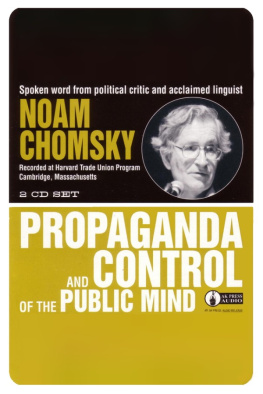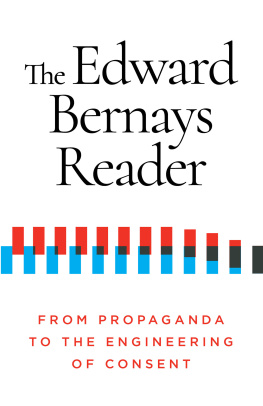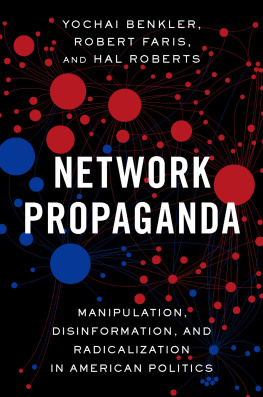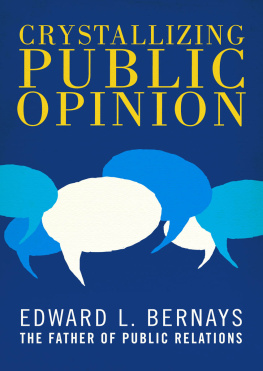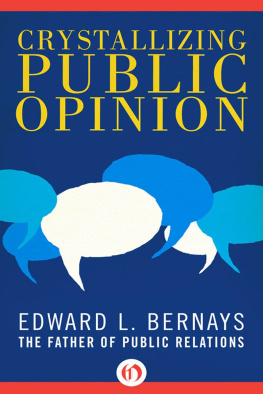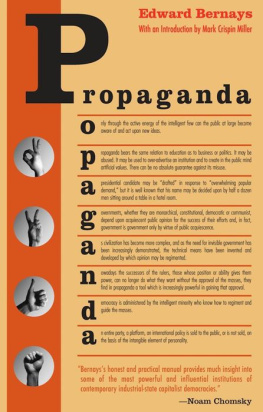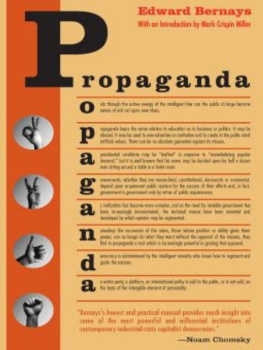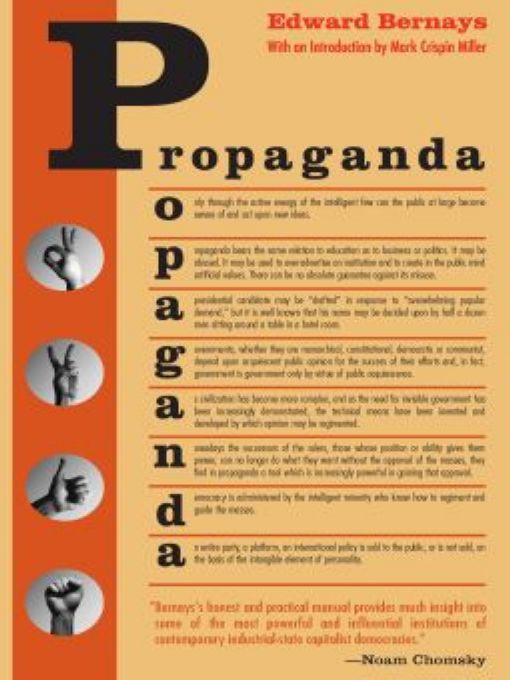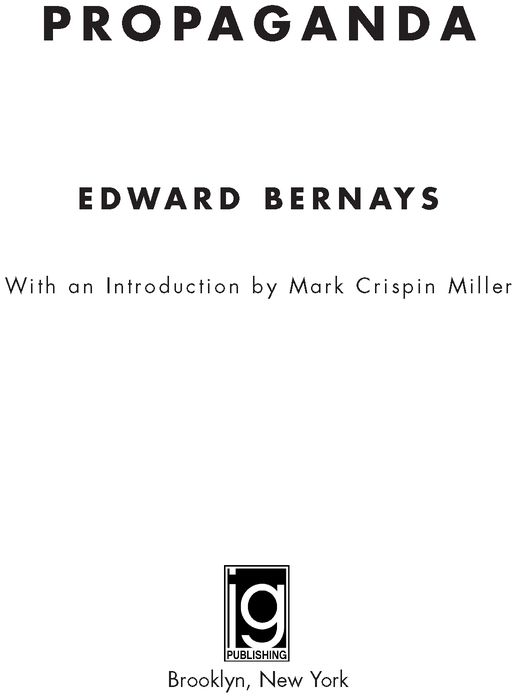Table of Contents
To my wife
Doris E. Fleischman
Some of the ideas and some of the material in this book have been used in articles written for The Bookman, The Delineator, Advertising and Selling, The Independent, The American Journal of Sociology, and other journals, to whom the author makes grateful acknowledgment.
INTRODUCTION
I.
Prior to World War One, the word
propaganda was little-used in English, except by certain social activists, and close observers of the Vatican; and, back then,
propaganda tended not to be the damning term we throw around today. The word had been coined in 1622, when Pope Gregory XV, frightened by the global spread of Protestantism, urgently proposed an addition to the Roman curia. The Office for the Propagation of the Faith (
Congregatio de propaganda fide) would supervise the Churchs missionary efforts in the New World and elsewhere: They are to take account of and to deal with each and every concern for the spread of the faith throughout the world. Far from denoting lies, half-truths, selective history or any of the other tricks that we associate with propaganda now, that word meant, at first, the total opposite of such deceptions. Of the sheep now wretchedly straying the world over, Gregory wrote:
Especially it is to be desired that, inspired by divine grace, they should cease to wander amidst heresies through the unhappy pastures of infidelity, drinking deadly and poisonous water, but be placed in the pasture of the true faith, that they may be gathered together in saving doctrine, and be led to the springs of the waters of life.
The word seems to have retained its strongly Catholic aura well into the 19th century; and, often, when the user stressed that Roman origin, the word would be pejorative. Derived from this celebrated society [the
Congregatio de propaganda fide], the name
propaganda applied in modern political language as a term of reproach to secret associations for the spread of opinions and principles which are viewed by most governments with horror and aversion, writes the British chemist William Thomas Brande in 1842. However, while the word then
could be used to make a sinister impression, it did not automatically evoke subversive falsehood, as it has since the 1920s. In his
English Traits (1856), for instance, Emerson uses
propagandist as an adjective not at all suggestive of the stealthy spread of some pernicious creed or notion. He describes the British as still aggressive and propagandist, enlarging the dominion of their arts and libertya passage that associates propaganda not with alien subversion but the most enlightened rule:
Their laws are hospitable, and slavery does not exist under them. What oppression exists is incidental and temporary; their success is not sudden or fortunate, but they have maintained constancy and self-equality for many ages.
Prior to the war, the words derogatory use was far less common than its neutral denotation. Here, for example, is the calm (and accurate) definition given in the Oxford English Dictionary: Any association, systematic scheme, or concerted movement for the propagation of a particular doctrine or practice. Thus was propaganda generally perceived not as an instrument for striking horror and aversion in the souls of government officials, but as an enterprise whose consequences might seem horridor innocuous, or even beneficial, depending on its authors and their aim (and the perceivers point of view). A campaign to improve public health through vaccination, sanitary cooking or the placement of spittoons was, or is, no less a propaganda drive than any anti-clerical or socialist or nativist crusade. Evidently this fact was apparent to those few who used the wordwhich did not become a synonym for big black lies until the Allies made the word familiar to the masses of Great Britain and America. Until then, propaganda was a term so unimportant that there is no definition for it in the great 1911 Encyclopedia Britannica (which does include a short entry for propagate).
The war had a complex effect on the repute of propaganda. Although the practice had, albeit unnamed, been variously used by governments for centuries (Napoleon was especially incisive on the subject, as well as an inspired practitioner), it was not until 1915 that governments first systematically deployed the entire range of modern media to rouse their populations to fanatical assent. Here was an extraordinary state accomplishment: mass enthusiasm at the prospect of a global brawl that otherwise would mystify those very masses, and that shattered most of those who actually took part in it. The Anglo-American drive to demonize the Hun, and to cast the war as a transcendent clash between Atlantic civilization and Prussian barbarism, made so powerful an impression on so many that the worlds of government and business were forever changed.
Now public opinion stood out as a force that must be managed, and not through clever guesswork but by experts trained to do that all-important job. Thus the war improved the status of those working in the fields of public suasion. Formerly, the lords of industry and commerce had often seen the advertising agent as a charlatan, associated with the tawdry bunkum used to peddle patent medicines and cigarettes, and trying to sell a service that any boss with half a brain could surely manage on his own. The nascent field of public relations also had been disesteemed by those atop the social pyramid, who saw that sort of work as necessary only on the vaudeville circuit and on Broadway. The great Allied campaign to celebrate (or sell) Democracy, etc., was a venture so successful, and, it seemed, so noble, that it suddenly legitimized such propagandists, who, once the war had ended, went right to work massaging or exciting various publics on behalf of entities like General Motors, Procter & Gamble, John D. Rockefeller, General Electric.
And so, from the signing of the Versailles Treaty to the Crash of 1929, there was high excitement in the booming field of peace-time propaganda. That reborn generation of admen and publicists, no longer common hucksters but professionals, sold their talents to Big Business through a long barrage of books, essays, speeches and events extolling the miraculous effects of advertising and/or publicityi. e., propaganda, as the proponents of the craft, and their corporate clients, often kept referring to it, quietly. According to the propagandists evangelical self-salesmanship (many of them were in fact the sons of ministers), their revolutionary science would do far more than make some people richer. Just as during the war, propaganda would at once exalt the nation and advance the civilizing process, teaching immigrants and other folks of modest means how to transform themselves, through smart consumption, into happy and presentable Americans. Throughout the Twenties, as propagandas earnest advocates devoutly pushed that faux-progressive line, propaganda seemedat least to those who peddled ita wondrous new progressive force, capable of brightening every life and every home. That quasi-religious pitch was memorably made in books like Earnest Elmo Calkinss Business the Civilizer (1928), Bruce Bartons best-selling parable The Man Nobody Knows (1925), and, less distinctively, in countless other works of what we might call propaganda propaganda. Like its wartime prototype, the post-war propaganda drive was an immense success, as it persuaded not just businessmen but journalists and politicians that the manufacture of consent, in Walter Lippmanns famous phrase, was a necessity throughout the public sphere.


